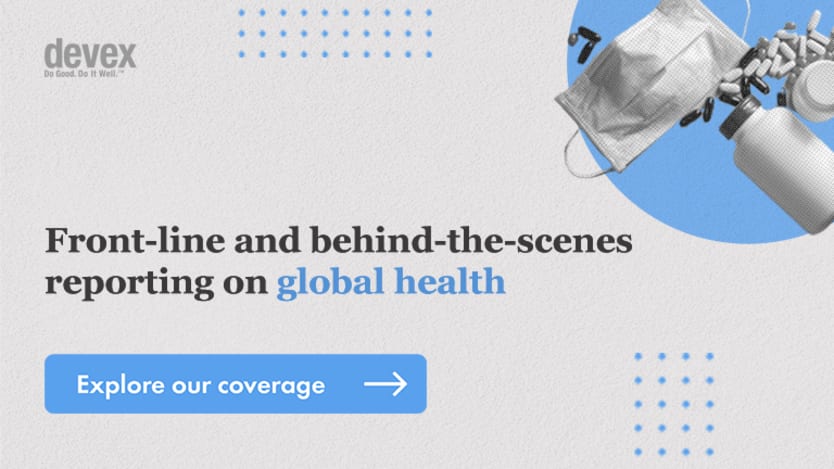
Cuba and Mexico have committed to open licensing their domestically developed COVID-19 vaccines, and Venezuela has proposed creating a tech-sharing platform that could run in parallel with the World Health Organization’s COVID-19 Technology Access Pool, at the conclusion of the Summit for Vaccine Internationalism, led by countries from the global south.
Sign up for Devex CheckUp
The must-read weekly newsletter for exclusive global health news and insider insights.
Summit organizers described the event as in “polar opposite” to the G-7 leaders meeting in early June that saw G-7 leaders agreeing to share an additional 870 million vaccine doses, but which health experts and activists argued is largely inadequate to achieve inoculation targets.
WHO has appealed to the G-7 to help vaccinate at least 70% of the world’s population by mid-2022. But the leaders’ dose-sharing commitments of up to 1 billion doses would only reach just 10.3% of the population in low- and middle-income countries by that time period, according to an analysis by the ONE Campaign.
“This is an inadequate solution on its own, simply because of the fact that we have people dying in the thousands every single day in what has become effectively a developing country pandemic,” Achal Prabhala, coordinator of the AccessIBSA project and co-moderator at the event, said in a press conference on Monday.
The summit was largely led by officials in middle-income countries, particularly ministers from Latin American countries, who committed to openly collaborate on COVID-19 vaccine technology, provide regulatory capacity support to countries in need, and pool manufacturing capacity for the production of vaccines and other medical equipment such as personal protective equipment and oxygen.
“I think that the countries who convened together ... they are motivated by I think the failure of all the existing systems to give them the kind of vaccine supply that they need.”
— Achal Prabhala, coordinator, AccessIBSA projectCuba and Mexico offered to collaborate on vaccine trials and open licensing for other countries to be able to produce their domestically developed vaccines, such as Cuba’s Soberana 2 and Mexico’s Patria.
Cuba’s Soberana 2 has shown 62% efficacy, according to preliminary data from late-stage trials released over the weekend. The vaccine is currently being administered in the country as part of efforts to stem another wave of COVID-19 infections. Another of Cuba's vaccine candidates, Abdala — a three-dose vaccine — has shown 92.28% efficacy.
Cuba’s Deputy Minister of Public Health, Dr. Regla Angulo Pardo, also told summit participants that “Cuban vaccines will be affordable and will benefit those most in need,” according to a news release shared by summit organizer Progress International.
Mexico’s Deputy Secretary of Prevention and Health Promotion Dr. Hugo López-Gatell Ramírez said that Mexico’s Patria vaccine “would include a scheme for solidarity pricing for other countries,” according to the same news release.
Licensing contracts typically include a standard royalty rate paid by manufacturers that receive the technology and assistance to manufacture a medical product such as a vaccine. While no vaccine pricing per se was agreed on, Prabhala said that countries who participated in the summit made clear that the technology for their vaccine candidates will be shared “at rates that are affordable.”
Health officials from Mexico and Argentina also offered support on regulatory assessments and approvals of COVID-19 vaccines, such as Russia’s Sputnik V vaccine and India’s Covaxin developed by Bharat Biotech.
Venezuela offered its manufacturing industry to ramp up production of vaccines and other medical equipment, and Foreign Minister Jorge Arreaza proposed a new technology sharing platform for participating countries.
“I think that the WHO and the COVAX facility have both had a degree of innovative suggestions that have really not been taken up well such as [sharing] technology platforms as well as have had failures I think in terms of the actual delivery of vaccines from a platform like COVAX,” said Prabhala.
“I think that the countries who convened together ... they are motivated by I think the failure of all the existing systems to give them the kind of vaccine supply that they need,” he added.
Varsha Gandikota, a coordinator of the summit, said that Venezuela’s proposal goes beyond just sharing vaccine technology, but also a mapping of where there’s production potential for raw materials and other components such as syringes, data for which has been a challenge for those trying to produce vaccines.
Progressive International is “in the process of arranging follow-up meetings where the specifics of the proposals will be determined, such as timelines,” said James Schneider, its communications director.
There were questions on whether the summit would bring about pressure in high-income countries and large pharmaceutical companies to reconsider what many health activists have described as a monopoly over patent rights and produce an alternative pharmaceutical system.
“I think if it turns out that a model of solidarity and cooperation, such as the one that emerged out of the summit, is something that creates ... pressure for Western vaccine manufacturers and Western governments, that would be a great thing,” said Prabhala.









